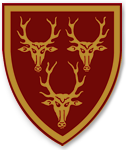
The beautiful Dunster House Library (W219) and the Reading Room (W219D) are available to Dunster House residents 24 hours a day, 7 days a week! Please see below for guidelines on using the space, and to learn more about the Dunster Library's long and rich history.
Library Guidelines
- The library is for silent study only. (The dining hall and other common spaces are available for group study.)
- Non-Dunster students must be accompanied by a Dunster resident when accessing the space.
- No food or drink is permitted in the library.
- Nothing (including books) may be checked-out or removed from the library.
- Kindly refrain from touching the musical instruments. Many of these are antiques!
Library History
 The library's history dates back to 1930 when Dunster, one of the first two Harvard residential Houses, first opened. At that time, former Dean of Harvard College and the first Master of Dunster House Chester Noyes Greenough made the House Library one of his foremost priorities. His efforts quickly proved fruitful. Through a $25,000 gift in memory of Alexander Moss White (1892) and numerous other donations, the library had over 11,000 books by the end of the first year.
The library's history dates back to 1930 when Dunster, one of the first two Harvard residential Houses, first opened. At that time, former Dean of Harvard College and the first Master of Dunster House Chester Noyes Greenough made the House Library one of his foremost priorities. His efforts quickly proved fruitful. Through a $25,000 gift in memory of Alexander Moss White (1892) and numerous other donations, the library had over 11,000 books by the end of the first year.
During the latter half of the 20th century Dunster became widely known for its library and for the regular arts and music programming hosted in this space. This was largely due to the efforts of Dunster's first, and only, Composer in Residence, Charley Kletzsch.
Charles “Charley” F. Kletzsch became an institution during his fifty years at Dunster House. After completing his undergraduate degree at Harvard College, Kletzsch moved to Dunster and began serving as House librarian in the fall of 1952. He went on to become a Resident Tutor in 1953 after earning a Master’s degree in Music. Realizing that the life of an academic would not allow him to compose as often or as freely as he would like, Kletzsch instead became Dunster’s first Composer in Residence. This provided him with both the creative freedom and the student interaction he so valued. He held this title for almost 50 years, living in a “secret room” in the House Library. Kletzsch played a crucial role in making Dunster central to the Harvard music scene in the second half of the 20th century. During his time as Composer in Residence, he organized wildly popular midnight chamber concerts in the library, wrote many musical pieces and “play poems” for students to perform, and became the House’s unofficial Poet Laureate. He also developed meaningful relationships with scores of Dunster students over the course of his 50 year tenure. In his Resident Tutor reapplication letter in 2000, Kletzsch wrote that he had remained in the House for half a century because he was so inspired by Dunster students. Students remember Kletzsch as a kind man who encouraged their interests and always made time for conversation. Senior Common Room Member and Harvard Professor Benjamin Friedman wrote of Kletzsch, “Dunster students have always found in Charlie one of the few who always has time for serious conversation....like....what kind of person he or she aspires to be, and above all, why.” Beloved by students and staff alike, Charley Kletzsch was as much a part of Dunster’s character as the building’s very foundations. He retired in 2002, but maintained a relationship with Dunster as a member of the Senior Common Room until his passing in 2009.
Today, the Dunster House Library continues to host regular music concerts, and its collection has continued to grow now houses some of the rarest texts on campus. It also remains a favorite among undergraduates, with a 2009 Flyby article described it as "without question the finest House library on campus."
It may even still have a secret room or two.
 Dunster House
Dunster House